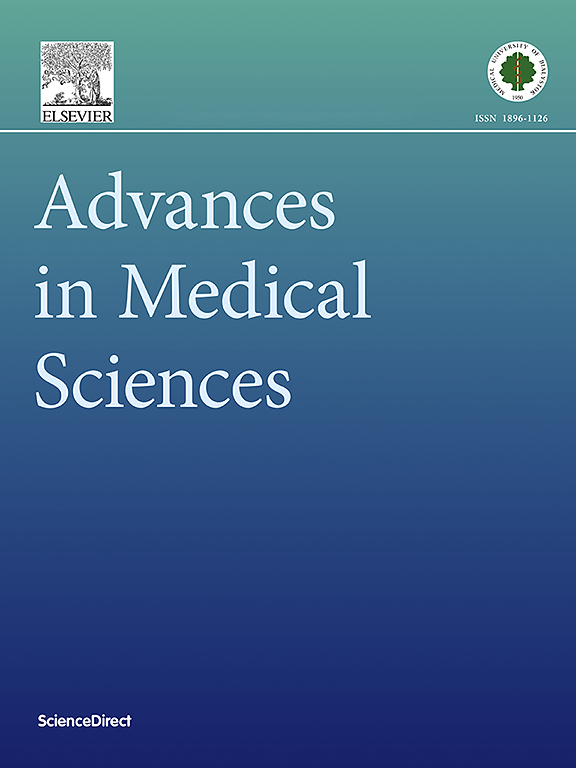复发性肝细胞癌与 MYC 目标基因组的富集、高置信度的有害突变以及 DDB2 和 BRCA1 转录本的替代剪接有关。
IF 2.6
4区 医学
Q3 MEDICINE, RESEARCH & EXPERIMENTAL
引用次数: 0
摘要
目的:复发是肝细胞癌(HCC)相关死亡的主要原因。通过比较分析复发和非复发 HCC 的全套转录本,可以更好地了解复发的生物学基础。本研究重新分析了21例诊断为复发性或非复发性HCC男性患者的转录组数据(GSE56545),以确定复发性HCC中的失调通路、体细胞突变、融合转录本、替代剪接事件和免疫环境:DESeq2用于差异表达分析,Mutect2用于体细胞突变分析,Arriba和STAR-Fusion用于融合转录本分析,rMATs用于替代剪接分析:结果发现,MYC靶基因集(Hallmark_MYC_targets_V1和Hallmark_MYC_targets_V2)在复发性HCC中明显富集。在MYC靶点中,CBX3、NOP56、CDK4、NPM1、MCM5、MCM4和PA2G4的上调与生存率低明显相关。体细胞突变分析表明,高置信度的有害突变数量在复发性 HCC 中明显增加。在复发性 HCC 中发现了替代剪接介导的无功能 DDB2 和致癌 BRCA1 D11q 的产生。最后,CD8+ T细胞在复发性HCC中明显减少:这些结果表明,MYC 靶基因组的富集是导致复发性 HCC 发生的最关键因素之一。结论:这些结果表明,MYC靶基因集的富集是导致复发性HCC发生的最关键因素之一,此外,有害突变数量的增加以及DDB2和BRCA1同工酶的替代剪接也是导致男性复发性HCC患者基因组不稳定性增加的主要原因。本文章由计算机程序翻译,如有差异,请以英文原文为准。
Recurrent hepatocellular carcinoma is associated with the enrichment of MYC targets gene sets, elevated high confidence deleterious mutations and alternative splicing of DDB2 and BRCA1 transcripts
Purpose
Recurrence is the main cause of hepatocellular carcinoma (HCC) related deaths. Underlying recurrence biology can be better understood by comparative analysis of the complete set of transcripts between recurrent and non-recurrent HCC. In this study, transcriptomic data (GSE56545) from 21 male patients diagnosed with either recurrent or non-recurrent HCC were reanalyzed to identify deregulated pathways, somatic mutations, fusion transcripts, alternative splicing events, and the immune context in recurrent HCC.
Materials and methods
DESeq2 was used for differential expression analysis, Mutect2 for somatic mutation analysis, Arriba and STAR-Fusion for fusion transcript analysis, and rMATs for alternative splicing analysis.
Results
The results revealed that MYC targets gene sets (Hallmark_MYC_targets_V1 and Hallmark_MYC_targets_V2) were significantly enriched in recurrent HCC. Among the MYC targets, CBX3, NOP56, CDK4, NPM1, MCM5, MCM4 and PA2G4 upregulation was significantly associated with poor survival. Somatic mutation analysis demonstrated that the numbers of high confidence deleterious mutations were significantly increased in recurrent HCC. Alternative splicing-mediated production of non-functional DDB2 and oncogenic BRCA1 D11q were discovered in recurrent HCC. Finally, CD8+ T-cells were significantly decreased in recurrent HCC.
Conclusions
These results indicated that the enrichment of MYC targets gene sets is one of the most critical factors that leads to the development of recurrent HCC. In addition, elevated deleterious mutation numbers and alternative spliced DDB2 and BRCA1 isoforms have been identified as prominent contributors to increasing genomic instability in male patients with recurrent HCC.
求助全文
通过发布文献求助,成功后即可免费获取论文全文。
去求助
来源期刊

Advances in medical sciences
医学-医学:研究与实验
CiteScore
5.00
自引率
0.00%
发文量
53
审稿时长
25 days
期刊介绍:
Advances in Medical Sciences is an international, peer-reviewed journal that welcomes original research articles and reviews on current advances in life sciences, preclinical and clinical medicine, and related disciplines.
The Journal’s primary aim is to make every effort to contribute to progress in medical sciences. The strive is to bridge laboratory and clinical settings with cutting edge research findings and new developments.
Advances in Medical Sciences publishes articles which bring novel insights into diagnostic and molecular imaging, offering essential prior knowledge for diagnosis and treatment indispensable in all areas of medical sciences. It also publishes articles on pathological sciences giving foundation knowledge on the overall study of human diseases. Through its publications Advances in Medical Sciences also stresses the importance of pharmaceutical sciences as a rapidly and ever expanding area of research on drug design, development, action and evaluation contributing significantly to a variety of scientific disciplines.
The journal welcomes submissions from the following disciplines:
General and internal medicine,
Cancer research,
Genetics,
Endocrinology,
Gastroenterology,
Cardiology and Cardiovascular Medicine,
Immunology and Allergy,
Pathology and Forensic Medicine,
Cell and molecular Biology,
Haematology,
Biochemistry,
Clinical and Experimental Pathology.
 求助内容:
求助内容: 应助结果提醒方式:
应助结果提醒方式:


